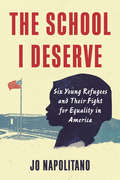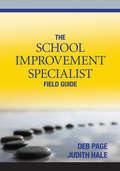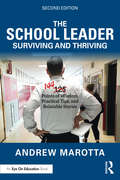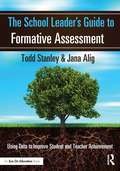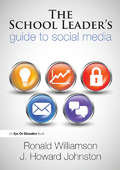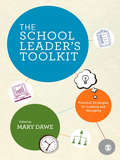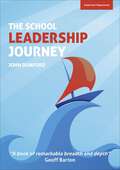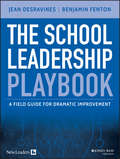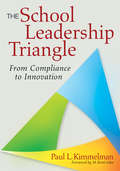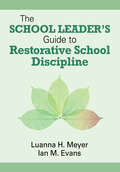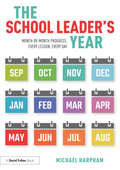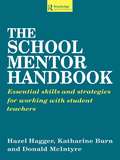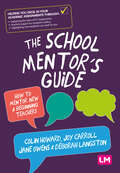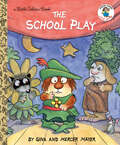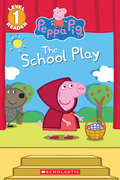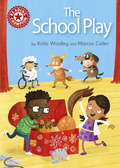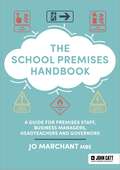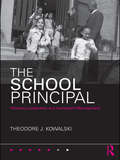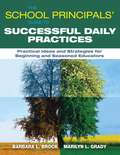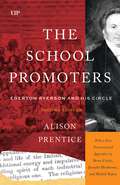- Table View
- List View
The School I Deserve: Six Young Refugees and Their Fight for Equality in America
by Jo NapolitanoUncovers the key civil rights battle that immigrant children fought alongside the ACLU to ensure equal access to education within a xenophobic nation Journalist Jo Napolitano delves into the landmark case in which the School District of Lancaster, Pennsylvania, was sued for refusing to admit older, non-English speaking refugees and sending them to a high-discipline alternative school. In a legal battle that mirrors that of the Little Rock Nine and Brown v. Board of Education, 6 brave refugee students fought alongside the ACLU and Education Law Center to demand equal access. The School I Deserve illuminates the lack of support immigrant and refugee children face in our public school system and presents a hopeful future where all children can receive an equal education regardless of race, ethnicity, or their country of origin.One of the students, Khadidja Issa, fled the horrific violence in war-torn Sudan with the hope of a safer life in the United States, where she could enroll in school and eventually become a nurse. Instead, she was turned away by the School District of Lancaster before she was eventually enrolled in one of its alternative schools, a campus run by a for-profit company facing multiple abuse allegations. Napolitano follows Khadidja as she joins the lawsuit as a plaintiff in the Issa v. School District of Lancaster case, a legal battle that took place right before Donald Trump&’s presidential election, when immigrants and refugees were maligned on a national stage. The fiery week-long showdown between the ACLU and the school district was ultimately decided by a conservative judge who issued a shocking ruling with historic implications. The School I Deserve brings to light this crucial and underreported case, which paved the way to equal access to education for countless immigrants and refugees to come.
The School I'd Like: Children and Young People's Reflections on an Education for the 21st Century
by Catherine Burke Ian Grosvenor‘Wonderfully illuminated by children's essays, stories, poems, pictures and plans, this ground-breaking book offers a unique snapshot of the perceptions of today's school pupils’. -French bookstore Lavoisier www.lavoisier.fr In 2001, The Guardian launched a ground-breaking competition called ‘The School I'd Like’, in which young people were asked to imagine their ideal school. This vibrant and compelling book presents material drawn from that competition, offering a unique snapshot of perceptions of schools by those who matter most - the pupils. In 2011, The Guardian re-launched the competition and this updated 2nd edition reflects upon the next generation of reflections and summarises, through the children’s insightful commentary, what has changed over the intervening decade. The book is wonderfully illustrated by children's essays, stories, poems, pictures and plans. Placing their views in the centre of the debate, it provides an evaluation of the democratic processes involved in teaching and learning by: • identifying consistencies in children's expressions of how they wish to learn • highlighting particular sites of 'disease' in the education system today • illustrating how the built environment is experienced by today's children • posing questions about the reconstruction of teaching and learning for the twenty-first century. The School I’d Like: Revisited offers a powerful perspective on school reform and is essential reading for all those involved in education and childhood studies, including teachers, advisors, policy-makers, academics, and anyone who believes that children's voices should not be ignored.
The School Improvement Specialist Field Guide
by Judith A. Hale Debra L. PageImprove student achievement by transforming schools as an SIS expert! Deb Page and Judith Hale, SIS authorities, guide new and transitioning school improvement specialists in applying high-leverage practices that result in systemic, sustainable, schoolwide improvement. With easy-to-use tools and protocols, both in the guide and online, this book offers the voice and counsel of a trusted coach while addressing how to: Establish enduring interventions with viable tools and methods Use time-tested processes to teach 21st-century skills to educators and students alike Seamlessly align improvement practices to the updated Institute for Performance Improvement Standards Transition smoothly into the school improvement specialist role
The School In The United States: A Documentary History (Third Edition)
by James W. FraserThe School in the United States collects the essential primary documents of the history of education in the United States, from Colonial America to present-day reform efforts. Expertly chosen by historian and education scholar James Fraser, these documents incorporate a wide range of sources, from first-person accounts to textbook excerpts and presidential speeches. As Fraser demonstrates, the history of American education is also a history of national debates and decisions about schooling, and he places the prominent voices of these debates in conversation through carefully curated selections, including the work of famous thinkers like Thomas Jefferson and W. E. B. Dubois, as well as that of ordinary classroom teachers. Organized by era, each chapter begins with a brief introduction intended to spark student interest, while a detailed bibliography suggests opportunities for further research. The School in the United States is comprehensive enough to be used as a main text, but selective enough to be used alongside another while making key readings in the history of American education accessible in a format that encourages students to make their own evaluations as they engage with major historical debates.
The School Leader Surviving and Thriving: 144 Points of Wisdom, Practical Tips, and Relatable Stories
by Andrew MarottaBecome more effective, efficient, and confident in your role as a school leader. This book provides tips, strategies, and inspirational stories to help you overcome common challenges, improve school culture, make deeper connections with parents and staff, and more. Appropriate for K-12 leaders in any type of setting, this updated edition includes new tips on handling difficult situations and being a connected educator. Each chapter presents key tips in quick, concise chunks so that you can easily implement one strategy at a time and survive and thrive in your leadership role. Take these tips and make them your own, so you can do your best for your students and staff!
The School Leader's Guide to Formative Assessment: Using Data to Improve Student and Teacher Achievement
by Todd Stanley Jana AligThis user-friendly guide shows school leaders how to use formative assessment to improve both student and teacher achievement. With step-by-step information and practical examples, this book will help you develop better assessments that will transform your school. You will learn: The advantages of formative assessment When and why to use formative assessment How to develop valid and reliable assessments How to mimic the state assessment schedule How to organize and use data effectively How to use data to develop teacher leaders The appendix features more than ten pages of handy reproducibles that will help you implement formative assessments immediately (also available as free downloads www.routledge.com/9781596672468). A curriculum pacing guide A presentation template to explain formative assessment to your staff A non-mastery report A class item analysis graph A class profile graph A student questionnaire, and more!
The School Leader's Guide to Social Media
by Ronald Williamson Howard JohnstonSocial media has exploded onto American culture — including our schools — giving educators a unique opportunity to shape this phenomenon into a powerful tool for improving educational leadership practices. With real-world examples and practical tips, this essential guide shows school leaders how to address both the potential benefits and common concerns presented by social media. It is written in a clear, reader-friendly format, and covers important topics, including: Responding to student safety issues, such as cyberbullying and sexting Improving school management, communication, and professional growth Instructional innovation Twenty-first century learning Preparing for future social media trends This is a must-have resource for school leaders who want to stay current and provide the best possible educational environment for learning in the 21st century.
The School Leader's Toolkit: Practical Strategies for Leading and Managing
by Mary Dawe'This is a practical, down-to-earth toolkit for a wide range of leadership areas, and the authors helpfully include practical examples and reflective exercises. Any new leader will appreciate this book'-Gillian Gee, GL Education 'This engaging and very practical book shows how leadership and management should "work" to help meet the challenge of raising pupil achievement'-Professor Peter Earley, Institute of Education This accessible and jargon-free book addresses key everyday topics faced by practising leaders. Providing hands-on examples and advice, the book shows you how to handle difficult decisions, resolve conflict, and prepare for Ofsted. Each chapter, written by a specialist in the area, contains: - bulleted chapter objectives - vignettes, thinking points, student quotes - case studies, figures and tables - ideas for best practice - further book and web reading This guide caters for leaders at any level, especially those undertaking further professional development and practice-based assessment. It will also be valuable to entry-level Master's students, and anyone on NPQH, Leadership Pathways and national programmes for headteachers and academy principals. Until recently Mary Dawe was Head of Leadership Development at The London Centre for Leadership in Learning at The Institute of Education, University of London. She is now an independent consultant.
The School Leadership Journey: What 40 Years in Education Has Taught Me About Leading Schools in an Ever-Changing Landscape
by John DunfordJohn Dunford was general secretary of the Association of School and College Leaders from 1998 to 2010. Prior to that, he was a member of the leadership team of three secondary schools in the north-east of England from 1974 to 1998, including 16 years as head of Durham Johnston Comprehensive School, an 11-18 school with 1500 pupils. In this outstanding book, John reveals all that he has learned about teaching and leadership over a stellar 40-year career, interweaved with a series of enlightening stories about government education policy over the last 20 years and the way in which successful schools have navigated the changing policy landscape.
The School Leadership Journey: What 40 Years in Education Has Taught Me About Leading Schools in an Ever-Changing Landscape
by John DunfordJohn Dunford was general secretary of the Association of School and College Leaders from 1998 to 2010. Prior to that, he was a member of the leadership team of three secondary schools in the north-east of England from 1974 to 1998, including 16 years as head of Durham Johnston Comprehensive School, an 11-18 school with 1500 pupils. In this outstanding book, John reveals all that he has learned about teaching and leadership over a stellar 40-year career, interweaved with a series of enlightening stories about government education policy over the last 20 years and the way in which successful schools have navigated the changing policy landscape.
The School Leadership Playbook: A Field Guide for Dramatic Improvement
by Jean Desravines Benjamin FentonA proven framework for whole-school improvement The School Leadership Playbook is a practical guide for education leaders looking to push their school's and students' achievement to the next level. Developed by renowned leadership preparation program New Leaders, the Transformational Leadership Framework focuses on the five categories that drive a school's success: Learning and Teaching, School Culture, Talent Management, Operations and Systems, and Personal Leadership. This book illustrates how each of these factors contributes to breakthrough gains, and outlines a plan for implementing changes in your own school. You'll learn how to accurately diagnose the current state of your school's academics and culture and create an action plan for the year ahead. The TLF is grounded in the latest research and case studies of the highest-gaining turnaround schools, and shows you the specific actions you can take to attract, retain, and support high-performing teachers; improve school culture; successfully involve parents and the community; and ultimately drive student success. New Leaders developed the UEF to pinpoint what schools achieving significant student academic gains were doing, and how they were doing it. This book provides a practical breakdown of the framework to help you begin leading these changes in your own school. Ensure rigorous goal- and data-driven teaching and learning Build and manage a high-performance faculty aligned to the school's vision Implement effective and efficient operations and systems Model the tone you would like to see from students and teachers school-wide By matching the needs of the school to effective principal actions and school practices, leaders can create a plan for transformational change.
The School Leadership Triangle: From Compliance to Innovation
by Paul L. KimmelmanThe author's triangular framework based on federal policy compliance, effective leadership, and innovation helps schools and districts achieve continuous improvement in the 21st century.
The School Leader’s Guide to Restorative School Discipline
by Professor Luanna H. Meyer Dr William John EvansA positive model for restorative discipline The authors provide a research-based and field-tested model that gives school leaders more productive alternatives to punishment, exclusion, and out-of-school suspension. This positive program helps improve behavior and keep students in school. This guide’s model covers school-wide prevention, restoration, and intervention needs for students with emotional, behavioral, and conduct disorders (such as bullying) as well as developmental disabilities and autism. Key topics include: The latest research on the effectiveness of restorative discipline How to implement a comprehensive, school-wide discipline plan Ways to support and sustain the plan with teacher teams Networking with community services such as child protection, child welfare, juvenile justice, and mental health professionals
The School Leader’s Year: Month-by-Month Progress, Every Lesson, Every Day
by Michael HarphamThis practical handbook offers a month-by-month guide to the curriculum, assessment, progress, and leadership over the school year. It provides a clear, comprehensive, and coherent structure to the academic year helping school leaders to prioritise their time and workload, supporting them and their team to work as efficiently and effectively as possible. Considering the statutory and key leadership activities from admissions, induction, transitions, and parents’ evenings to coursework, timetabling, assessment, staff performance, and much more, the book provides a clear plan of action to ensure school leaders have prepared their work at the optimal time over the year. Each chapter features tried-and-tested strategies to help schools put robust systems and processes in place alongside guidance on sustaining pace, developing resilience, and exam preparation and technique. Full of practical tips to help improve progress and including real-world examples of leadership in action from leaders working in primary and secondary schools, this is essential reading for all school leaders that want their students to be as successful as they can possibly be in every lesson, every day.
The School Mentor Handbook: Essential Skills and Strategies for Working with Student Teachers
by Burn, Katherine Hagger, Hazel McIntyre, DonaldThis manual offers practical guidelines for mentors working with student teachers, based on the authors' experience within the Oxford Internship Scheme. It consists of materials that have been used on the pilot scheme, each of which is evaluated in light of the authors' success with them.
The School Mentor’s Guide: How to mentor new and beginning teachers
by Joy Carroll Colin Howard Jane Owens Deborah LangstonThe ultimate guide for current and aspiring school mentors. Whether you are a recently qualified teacher who has taken on their first mentee or are a professional mentor who is responsible for groups of trainees and teachers in the early years of their careers, this book explores what effective mentoring is and how to succeed in your role. The book: · Provides a framework for you as a school-based mentors to work within. · Outlines the key skills and qualities of effective in-school mentors. · Supports you in building confidence and raising the status of your role. · Brings greater coherence and consistency to school-based mentoring for trainee and beginning teachers.
The School Mentor’s Guide: How to mentor new and beginning teachers
by Joy Carroll Colin Howard Jane Owens Deborah LangstonThe ultimate guide for current and aspiring school mentors. Whether you are a recently qualified teacher who has taken on their first mentee or are a professional mentor who is responsible for groups of trainees and teachers in the early years of their careers, this book explores what effective mentoring is and how to succeed in your role. The book: · Provides a framework for you as a school-based mentors to work within. · Outlines the key skills and qualities of effective in-school mentors. · Supports you in building confidence and raising the status of your role. · Brings greater coherence and consistency to school-based mentoring for trainee and beginning teachers.
The School Play (Little Golden Book)
by Mercer MayerLittle Critter gets a part in the school play in this classic Little Golden Book!Little Critter and his classmates are excited about putting on a school play for their family and friends! Children ages two to five will enjoy this heartwarming full-color Little Golden Book, first published in 1995!
The School Play Ebk (Peppa Pig)
by Meredith Rusu<P>Peppa Pig's class is putting on a school play! Peppa stars as Little Red Riding Hood and Danny Dog is the Big Bad Wolf. Pedro Pony is the hunter -- but he's very shy. Will all of the children remember their lines and make the play a big success? Find out in this Level 1 reader with stickers! <P>Based on the hit television show, as seen on Nick Jr.
The School Play: Independent Reading Red 2 (Reading Champion #367)
by Katie WoolleyLil and Tim are having trouble choosing an outfit for the school play ... what will they be?Reading Champion offers independent reading books for children to practise and reinforce their developing reading skills.Fantastic, original stories are accompanied by engaging artwork and a reading activity. Each book has been carefully graded so that it can be matched to a child's reading ability, encouraging reading for pleasure. Perfect for the 4-5 year old beginner reader or those reading book band red.
The School Premises Handbook: a guide for premises staff, business managers, headteachers and governors
by Jo MarchantA handbook to inform school premises staff, business managers, headteachers and governors in England of their legal responsibilities around buildings compliance. As well as exploring the impact of school buildings and grounds on student learning, The School Premises Handbook covers the working environment, fire safety, health and safety, statutory compliance duties, planning for maintenance, risk assessments, energy efficiency, environmental sustainability, and managing and developing a premises team. Jo Marchant, a highly experienced head of estates, introduces key legislation, further information sources, and an action checklist. New premises staff will find a wealth of information, from what to do on their first day in the role to planning the year-long cycle of maintenance activities. More experienced premises staff will also gain plenty of useful insights. School business managers will find advice on managing premises staff and developing their school estate. Headteachers will be informed of their responsibilities for ensuring their schools are safe and compliant. And governors and trustees will learn how to hold school leadership to account.
The School Premises Handbook: a guide for premises staff, business managers, headteachers and governors
by Jo MarchantA handbook to inform school premises staff, business managers, headteachers and governors in England of their legal responsibilities around buildings compliance. As well as exploring the impact of school buildings and grounds on student learning, The School Premises Handbook covers the working environment, fire safety, health and safety, statutory compliance duties, planning for maintenance, risk assessments, energy efficiency, environmental sustainability, and managing and developing a premises team. Jo Marchant, a highly experienced head of estates, introduces key legislation, further information sources, and an action checklist. New premises staff will find a wealth of information, from what to do on their first day in the role to planning the year-long cycle of maintenance activities. More experienced premises staff will also gain plenty of useful insights. School business managers will find advice on managing premises staff and developing their school estate. Headteachers will be informed of their responsibilities for ensuring their schools are safe and compliant. And governors and trustees will learn how to hold school leadership to account.
The School Principal: Visionary Leadership and Competent Management
by Theodore J. KowalskiOver the past two decades, efforts to improve schools have significantly modified role expectations for principals. Today, school-level administrators are expected to be both visionary leaders and competent managers. Based on the conviction that administration is an amalgam of leadership and management, The School Principal emphasizes the need for practitioners to apply conceptual skills to make "what to do" decisions, to apply technical skills to make "how to do" decisions, and to apply relational skills to engage in democratic decision making. Kowalski frames the book with a discussion of the nature of schools, the roles of principals, and their need to improve schools. The book then provides a balanced treatment of leadership and management, covering issues of personal behavior, instructional leadership, relationship building issues, finances, facilities, personnel management, pupil services, and maintaining safe schools. The text closes with discussion of the vital aspects of practice for contemporary principals, addressing problem solving, collaborative change strategies, and personal commitment to being a principal. Special Features: Vignettes introduce the subject matter in the context of common challenges faced by practitioners. Knowledge-Based Questions and Skill-Based Activities prompt readers to engage with and reflect on the chapter content. The School Principal aligns with the Educational Leadership Consortium Council (ELCC) Standards. Treating principals as concurrently visionary leaders and competent managers, this excellent text addresses the needs of aspiring and practicing principals, providing the tools to build effective and efficient schools.
The School Principals' Guide to Successful Daily Practices: Practical Ideas and Strategies for Beginning and Seasoned Educators
by Marilyn L. Grady Barbara L. BrockWhile many books outline the attributes of successful school leaders, few describe how those traits manifest in daily practice. The Daily Practices of Successful Principals goes beyond the outward picture of excellence and provides a compendium of daily practices used by successful principals in various settings. Written by former administrators who have walked in your shoes, this handy guide's strategies are based on interviews with successful leaders and are applicable in multiple contexts. Inside you will find guidelines for: Examining your values, educational platform, and personal style Establishing learning as a common purpose Identifying and leading school change Managing staff and student relationships effectively Developing teacher leadersThe authors understand that principals are expected to have the patience of Job, the tenacity of Atlas, the compassion of Mother Teresa, and a sense of humor. The recommended daily practices will help you stay focused on the most important things-leading effectively, promoting student achievement, and making a positive difference in students' lives.
The School Promoters: Egerton Ryerson and His Circle, Second Edition (Canadian Social History Series)
by Alison PrenticeAlison Prentice's 1977 groundbreaking monograph The School Promoters is a revisionist account of public education’s emergence. This latest edition includes a foreword and appendices by editors Bruce Curtis, Jennifer Henderson, and Mythili Rajiva, offering updated analysis and primary documents that deepen the understanding of Egerton Ryerson’s role in shaping Ontario’s educational system. Using a wide range of archival and published sources, The School Promoters provides a lucid account of the preoccupations of the White, mostly middle-class reformers connected to Ryerson, who were responsible for the advent of public education in Ontario as part of their concern with the future of Canadian society. This edition situates Prentice’s analysis of class domination within the context of settler-colonialism, exploring how education worked as a project for genocide as well as a means of social discipline. In particular, the editors expose how the proclaimed universality of public education was contradicted by the reformers’ logic for targeting paupers and Indigenous peoples with religious schooling. A reparative reading of Prentice's influential work, The School Promoters: Egerton Ryerson and His Circle, Second Edition highlights the relevance of this groundbreaking social history to contemporary analysis of Canada.
